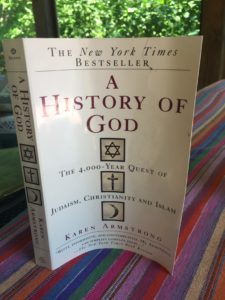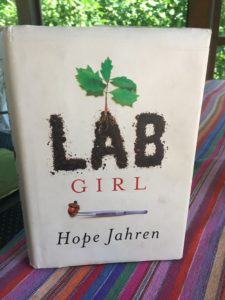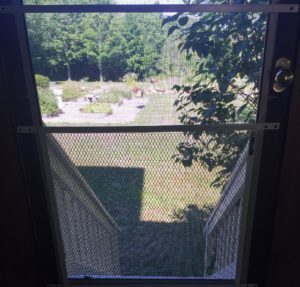Just as I enter into a lovely time of not working, I see examples of work everywhere. It must be a sign that this vacation can’t last long.
Since I’m not accompanying my husband to the 10-day long, give or take a few hours, Episcopal Convention in Texas, but will be partly with him in spirit, I thought it would be a good time to pull out a book by Karen Armstrong that’s been on my shelf for a while. You know, a little light summer reading.

When you’re trying to write about your own journey as a clergy spouse, there’s no end to the different kinds of research that beckons. Of course, I need only keep learning the key features of good memoir, not become a theologian; but still, I maintain a thirst for good books about religion, much as I also continue to gravitate towards good books about science. As it happens, I have one of those going too.
In any case, a few sentences in the Introduction held my attention.
Despite its otherworldliness, religion is highly pragmatic. We shall see that it is far more important for a particular idea of God to work than for it to be logically or scientifically sound. As soon as it ceases to be effective it will be changed—sometimes for something radically different. (p. xxi)
First of all, isn’t “otherworldliness” a wonderful word? No hyphen at all, as if in recognition that of course there are other realities than the one visibly surrounding us. And how about the claim that religion is “pragmatic” and that an idea about God must “work”? This is a bit startling at first and then just fascinating.
In a way, and I could be wrong, what members of a certain denomination are doing when thousands of them gather for a series of meetings, is checking to see how well their specific ideas about their particular faith are holding up, making small tweaks (please– no tweets) as they might be needed. Nobody is expecting anything to be “radically different” but over time, there are slight adjustments…or maybe not so slight. My husband informs me that the conversation, now many decades long, continues about how referring to a masculine God doesn’t “work” for all people the way it once did. Are there other models for language about God, other than “he/she” that can better allow women to see that we, too, are made in God’s image?
Funny that I should read Armstrong’s passage on the very same day I was appreciating the various kinds of workmanship –in this case, the worker was indeed a man– going on around here before Rob packed his bag and pushed off.
On his final morning, especially, he was a whirling dervish of practical activity.
Having the previous evening helped a couple of our kids with an essential task some distance away, he arose early to finish (except for the painting) the carpentry work he’d plunged into some days before, addressing the crying need to re-side the exterior of the garage with new framing, sheathing and clapboard. Somehow, I’d gone through the doorway countless times without noticing the crisis. I could say I had weighty spiritual matters on my mind, but that wouldn’t be true. Insects and moisture—they’re not friendly to wood.
After that was done, he moved on, without skipping a beat, to repair the screen door that goes from the porch to the back yard. Without casting aspersions on our dog, I’ll offer that recent events had left no doubt that the door needed a mightier kind of screen than we had first expected.
Not that dogs always choose to exit, human-like, through doors; but no clergyman, or anyone else for that matter, can be expected to replace the entirety of the screens out there along with doing another regular job.
Then he replaced the clothesline that had worn out. And then he extricated some nasty vines (unlike the benevolent kind on the insignia for the Diocese of New Hampshire) that had infiltrated cedar shrubs…right near the little barn, now bearing one brand new side thanks to the work he did last summer. Only then did he pack, take a shower and head to the airport to Texas, all rested and ready to see how God wanted the church to “come, labor on” as one of the bishop’s favorite hymn goes.
Meanwhile, I have my dog, my books, my manuscript awaiting more tending, and the whole outdoors to keep me company around here. I never got around to reading Stephen King’s thrillers, but his On Writing: A Memoir of the Craft (Simon & Schuster, New York; 2000) is terrifically entertaining, besides offering excellent advice. And that other book on science I mentioned? It’s this one.

What this writer (her main expertise is in a branch of science called “geobiology”) does, structurally, is present chapters about her own scientific pursuits — featuring a close and hilarious relationship with her lab partner Bill — along with shorter chapters focusing completely on particular features of plants…but without her in them at all. And, wouldn’t you know, she and Karen Armstrong use similar terminology:
It turns out that there is no “right” or “wrong” way to grow into a hundred-year-old tree: there are only ways that work and ways that do not. (p. 211)
So the aging trees and ideas about God have something in common? Right now, outside my porch, branches are swaying and leaves are whispering in the breeze. I’ll try to hear what they’re saying, as my husband labors on, moving from meeting room to meeting room, far away.



